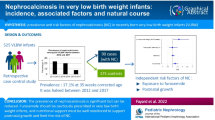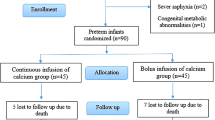Abstract
Nephrocalcinosis (NC) occurs frequently in preterm neonates. A high U-calcium/citrate is one of the contributing factors to the development of NC. In stone-forming children and adults citrate supplementation is a successful preventive therapy. In this randomized controlled trial the effect of citrate therapy was studied on the development of NC in preterm neonates with a gestational age <32 weeks. Thirty-eight preterm neonates (mean gestational age 29.8 weeks (SD 1.6), mean birth weight 1,300 g (SD 351) were treated with sodium citrate (0.52 mmol/kg/day in four doses) from day 8 of life until at term and 36 preterm neonates (mean gestational age 29.6 weeks (SD 1.6), mean birth weight 1,282 g (SD 256) were not treated. U-calcium, U-creatinine, U-citrate and U-pH were measured at day 7, 14, 21, 28 of life and at term. Renal ultrasonography (US) was performed at term. U-citrate/creatinine and U-pH were significantly higher and U-calcium/citrate was significantly lower in the citrate group at day 14, 21 and 28 compared with the control group (P<0.05). Complications of citrate administration were not encountered, however the incidence of NC was not significantly different in the treated (34%) compared with the control group (44%), P=0.37. Preterm neonates treated with citrate in the first months of life have higher U-citrate/creatinine and lower U-calcium/citrate compared with controls. Sodium citrate therapy in a dosage of 0.52 mmol/kg/day is safe but does not prevent NC. Whether a higher dose or potassium citrate decreases the incidence of NC should be evaluated in further studies.




Similar content being viewed by others


References
Jacinto JS, Modanlou HD, Crade M, Strauss AA, Bosu SK (1988) Renal calcification incidence in very low birth weight infants. Pediatrics 81:31–35
Short A, Cooke RW (1991) The incidence of renal calcification in preterm infants. Arch Dis Child 66:412–417
Downing GJ, Egelhoff JC, Daily DK, Alon U (1991) Furosemide-related renal calcifications in the premature infant. A longitudinal ultrasonographic study. Pediatr Radiol 21:563–565
Karlowicz MG, Katz ME, Adelman RD, Solhaug MJ (1993) Nephrocalcinosis in very low birth weight neonates: family history of kidney stones and ethnicity as independent risk factors. J Pediatr 122:635–638
Schell-Feith EA, Holscher HC, Zonderland HM, Kist-van Holthe JE, Conneman HN, van Zwieten PH, Brand R, van der Heijden AJ (2000) Ultrasonic features of nephrocalcinosis in preterm neonates. Br J Radiol 73:1185–1191
Saarela T, Vaarala A, Lanning P, Koivisto M (1999) Incidence, ultrasonic patterns and resolution of nephrocalcinosis in very low birthweight infants. Acta Paediatr 88:655–660
Narendra A, White MP, Rolton HA, Alloub ZI, Wilkinson G, McColl JH, Beattie J (2001) Nephrocalcinosis in preterm babies. Arch Dis Child Fetal Neonatal Ed 85:F207–F213
Hein G, Richter D, Manz F, Weitzel D, Kalhoff H (2004) Development of nephrocalcinosis in very low birth weight infants. Pediatr Nephrol 19:616–620
Alpert SA, Noe HN (2004) Furosemide nephrolithiasis causing ureteral obstruction and urinoma in a preterm neonate. Urology 64:589
Ezzedeen F, Adelman RD, Ahlfors CE (1988) Renal calcification in preterm infants: pathophysiology and long- term sequelae. J Pediatr 113:532–539
Downing GJ, Egelhoff JC, Daily DK, Thomas MK, Alon U (1992) Kidney function in very low birth weight infants with furosemide- related renal calcifications at ages 1 to 2 years. J Pediatr 120:599–604
Schell-Feith EA, Kist-van Holthe JE, Van Zwieten PH, Zonderland HM, Holscher HC, Swinkels DW, Brand R, Berger HM, van der Heijden BJ (2003) Preterm neonates with nephrocalcinosis: natural course and renal function. Pediatr Nephrol 18:1102–1108
Schell-Feith EA, Kist-van Holthe JE, Conneman N, Van Zwieten PH, Holscher HC, Zonderland HM, Brand R, van der Heijden BJ (2000) Etiology of nephrocalcinosis in preterm neonates: association of nutritional intake and urinary parameters. Kidney Int 58:2102–2110
Schell-Feith EA, Que I, Kok DJ, Kist-van Holthe JE, Kuhler E, Brand R, Papapoulos SE, van der Heijden BJ (2001) Modulation of calcium oxalate monohydrate crystallization kinetics by urine of preterm neonates. Am J Kidney Dis 38:1229–1234
Pak CY, Fuller C, Sakhaee K, Preminger GM, Britton F (1985) Long-term treatment of calcium nephrolithiasis with potassium citrate. J Urol 134:11–19
Hauser W, Frick J, Kunit G (1990) Alkali citrate for preventing recurrence of calcium oxalate stones. Eur Urol 17:248–251
Barcelo P, Wuhl O, Servitge E, Rousaud A, Pak CY (1993) Randomized double-blind study of potassium citrate in idiopathic hypocitraturic calcium nephrolithiasis. J Urol 150:1761–1764
Pak CY (1997) Southwestern Internal Medicine Conference: medical management of nephrolithiasis-a new, simplified approach for general practice. Am J Med Sci 313:215–219
Berg C, Larsson L, Tiselius HG (1992) The effects of a single evening dose of alkaline citrate on urine composition and calcium stone formation. J Urol 148:979–985
Adams ND, Rowe JC (1992) Nephrocalcinosis. Clin Perinatol 19:179–195
Al Qadreh A, Athanasopoulou H, Voskaki I (1992) Inhibitors of stone formation in hypercalciuric children with and without stone disease. Eur Urol 21:227–230
Sikora P, Roth B, Kribs A, Michalk DV, Hesse A, Hoppe B (2003) Hypocitraturia is one of the major risk factors for nephrocalcinosis in very low birth weight (VLBW) infants. Kidney Int 63:2194–2199
Pope JC, Trusler LA, Klein AM, Walsh WF, Yared A, Brock JW (1996) The natural history of nephrocalcinosis in premature infants treated with loop diuretics. J Urol 156:709–712
Leumann E, Hoppe B, Neuhaus T (1993) Management of primary hyperoxaluria: efficacy of oral citrate administration. Pediatr Nephrol 7:207–211
Unwin RJ, Capasso G, Shirley DG (2004) An overview of divalent cation and citrate handling by the kidney. Nephron Physiol 98:15–20
Preminger GM, Sakhaee K, Pak CY (1988) Alkali action on the urinary crystallization of calcium salts: contrasting responses to sodium citrate and potassium citrate. J Urol 139:240–242
Hojgaard I, Tiselius HG (1998) The effects of citrate and urinary macromolecules on the aggregation of hydroxyapatite crystals in solutions with a composition similar to that in the distal tubule. Urol Res 26:89–95
Kok DJ, Papapoulos SE, Blomen LJ, Bijvoet OL (1988) Modulation of calcium oxalate monohydrate crystallization kinetics in vitro. Kidney Int 34:346–350
White MP, Aladangady N, Rolton HA, McColl JH, Beattie J (2005) Urinary citrate in preterm and term babies. Early Hum Dev 81:319–323
Leumann E, Hoppe B, Neuhaus T, Blau N (1995) Efficacy of oral citrate administration in primary hyperoxaluria. Nephrol Dial Transplant 10 Suppl 8:14–16
Stapleton FB, McKay CP, Noe HN (1987) Urolithiasis in children: the role of hypercalciuria. Pediatr Ann 16:980–981,984–992
Kamitsuka MD, Williams MA, Nyberg DA, Fox KA, Lee DL, Hickok D (1995) Renal calcification: a complication of dexamethasone therapy in preterm infants with bronchopulmonary dysplasia. J Perinatol 15:359–363
Sonntag J, Gaude M (1998) Effect of dexamethasone and spironolactone therapy in calcium and phosphate homeostasis in premature infants with a birth weight under 1,500 g. Klin Padiatr 210:354–357
Author information
Authors and Affiliations
Corresponding author
Rights and permissions
About this article
Cite this article
Schell-Feith, E.A., Moerdijk, A., van Zwieten, P.H.T. et al. Does citrate prevent nephrocalcinosis in preterm neonates?. Pediatr Nephrol 21, 1830–1836 (2006). https://doi.org/10.1007/s00467-006-0274-4
Received:
Revised:
Accepted:
Published:
Issue Date:
DOI: https://doi.org/10.1007/s00467-006-0274-4


